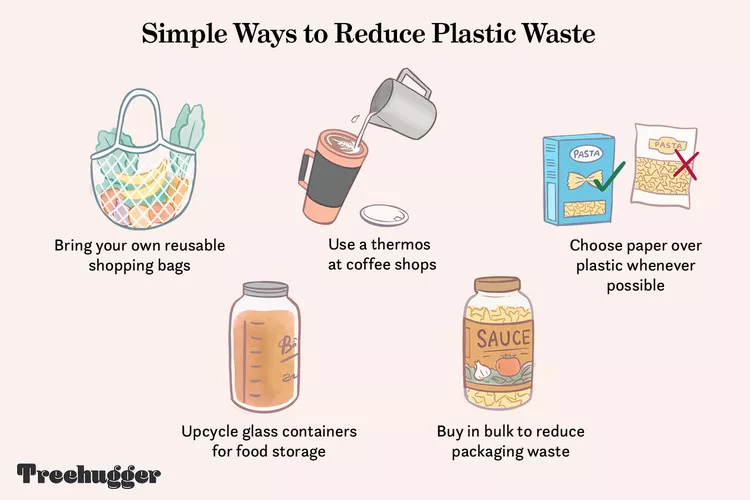Reduced Plastics
Reducing plastic usage is crucial for combating climate change, conserving natural resources, and minimizing environmental impacts. This approach involves reducing the production and consumption of single-use plastics and promoting alternatives.

Simple Ways to Reduce Plastic Waste (Treehugger)
View open jobs in this Solution
Example Companies
- 4ocean - Removes plastic waste from oceans and coastlines.
- Banyan Nation - Unlocking the circular economy and the market for premium recycled plastics.
- Loop Industries - Pioneers plastics recycling into virgin-quality materials.
- Green Dot Bioplastics - Develops biodegradable and compostable plastics.
- Suez - Provides comprehensive waste management and recycling services.
Overview
Reducing plastic usage is gaining momentum in combating climate change. Breakthroughs include plastic recycling, waste-to-energy incineration, and the development of plant-based and biodegradable plastics. Organizations like the World Wildlife Fund and the Ellen MacArthur Foundation are driving awareness and adoption.
- Greenlist Decarbonizes Online Retail Returns - Warming Up to Climate Tech
Progress Made
Significant advancements have been made in technologies to reduce plastic production:
- Plant-Based Plastics: Biodegradable and renewable, reducing reliance on fossil fuels.
- Advanced Recycling Technologies: Recycling plastics back into their original form, reducing landfill waste.
- Waste-to-Energy Incineration: Converting plastic waste into energy, reducing landfill volume.
Case Studies:
- Loop Industries, USA: Pioneers in recycling plastics into virgin-quality materials (Loop Industries). While innovative, the scalability and economic viability of their processes remain challenges.
- Banyan Nation, India: Unlocks the circular economy and the market for premium recycled plastics (Banyan Nation). The company has been praised for its innovative approaches but needs to address the environmental impact of its supply chain.
- Green Dot Bioplastics, USA: Develops biodegradable and compostable plastics (Green Dot Bioplastics). The company faces challenges related to the economic feasibility and scalability of its products.
Lessons Learned
- Reducing Reliance on Plastic: It's crucial to focus on reducing plastic use, not just recycling.
- Diverse Strategies: Cutting single-use plastics, recycling, and investing in alternatives are all necessary.
- Corporate Responsibility: Companies play a vital role in reducing plastic use, investing in recycling, and supporting education.
- Progress: Companies committing to reduced plastic use and government policies to cut plastic waste are essential.
Challenges Ahead
- Recycling Infrastructure: Reliable, affordable recycling infrastructure remains a challenge.
- High Recycling Costs: Overcoming high costs and addressing the lack of recycling facilities is necessary.
- Public Awareness: Increasing awareness about the benefits of reducing plastic use is essential.
- Corporate Accountability: Ensuring companies are held accountable for their environmental practices and potential greenwashing.
Best Path Forward
- Research and Development: Continue R&D for large-scale adoption of reduced plastic technologies.
- Environmental Effectiveness: Test, monitor, and ensure the technology's environmental effectiveness.
- Collaboration: Collaborate with leading companies and organizations to drive progress.
- Public Education: Educate the public on the importance of reducing plastic use.
Prominent supporters include the World Wildlife Fund, Ellen MacArthur Foundation, and The Recycling Partnership.
Image credit: Treehugger